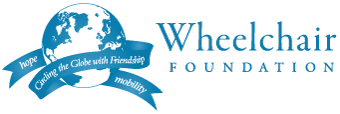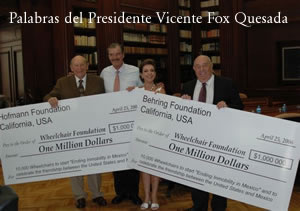 This article appeared in the September 2006 issue of Delta Sky Magazine
This article appeared in the September 2006 issue of Delta Sky Magazine
How could your life not be forever transformed, Ken Behring wonders, after a disabled, elderly Vietnamese woman, her teeth blackened and broken, confides that she wanted to die until you presented her with a wheelchair? After an immobile Guatemalan girl, forced to sit in a small box while her mother worked during the day, propels the wheelchair that you furnished to school and claims a future? After a Zimbabwean man crawls 12 miles on bloody elbows so he can receive your donation of a wheelchair? After a terminally ill Mexican boy who has lost both sight and mobility accepts his wheelchair and says, I will see you in heaven?
Virtually every time Behring delivers wheelchairs to disabled individuals through his Wheelchair Foundation (www.wheelchairfoundation.org), he encounters breathtaking sacrifice and gratitude. The emotionally charged occasions have changed Behring, a real-estate developer who is one of the worlds richest men, a friend of world leaders, a business innovator and a former owner of a professional football team.
I spent too much of my life pursuing things money can buy, says the soft-spoken Behring, 78. Ive always given money to charity, but in the past I didnt give myself with it. When you actually get an opportunity to personally help somebody, it changes your life.
The 6-year-old Wheelchair Foundation, based in Danville, California, aims to eradicate immobility worldwide, and its making tremendous progress. Through June of this year, it had donated more than half a million wheelchairs in some 140 countries, free to anyone who cant afford one, from toddlers to centenarians. By matching donor funds, the foundation is able to provide one wheelchair for every $75 contributed. Its allies include corporations, governments, individuals, nonprofit organizations, and small groups like Rotary clubs and the Knights of Columbus.
The need is immense?and growing. According to Behrings foundation, an estimated 100 to 150 million people worldwide need help to get around. Many have lost limbs to land mines, war or accidents; others are disabled by disease, birth defects or old age. In many developing countries, the immobile are stigmatized. They are cloistered in empty, darkened back rooms or huts. They navigate by crawling or are carried. Ashamed families rarely take them out in public.
A wheelchair is transformative, not only for the recipient but for family members, friends and others serving as caretakers? a circle of 10 people, on average.
They cant believe somebody actually cares enough to help them, says Behring. It not only changes their attitude but their whole familys and even their villages. When you show them people want to help, that can contribute toward peace in the world. I believe that.
The donation of a wheelchair is also often life-altering for the donors, especially those who go to the trouble of attending the often emotionally stirring distribution, when they may help lift or guide the new owners into their chairs.
Behring himself attends as many distributions as possible?25 last year, hundreds since the nonprofit organizations founding in 2000. These often festive events take place in diverse locales?from a remote Congolese jungle to an ultra-high-security military compound in Afghanistan. The needy in China have received the most wheelchairs from the foundation, but the group also works in the United States, including donating chairs to people affected by Hurricane Katrina last year.
Many [immobile people] have little hope, says Behring. But then you put them in a wheelchair and watch their expressions, their big smiles. Sometimes tears run down their cheeks and they grab your hands and wont let go. You speak different languages, but you dont have to say anything to feel and see the difference a wheelchair makes.
The Wheelchair Foundation may employ a staff of only 25 (three of whom are Behrings sons), but a network of supporters enable this seemingly small organization to have a wide reach. For example, 2,000 Rotary clubs worldwide have donated funds to the foundation and helped with the distribution of more than 150,000 wheelchairs.
Don Gentleman, the Knights of Columbus Wheelchair Foundation chairman for California, was awestruck when he attended a Guatemalan presentation of chairs. A man who had literally carried his disabled wife on his back for 12 years bawled like a baby for 45 minutes after she received a wheelchair, Gentleman recalls, adding, It gave him and his wife the hope, freedom and mobility that the foundation stands for.
Mark Healy was a top Rotary official in north central Texas when he hoisted a young boy into a wheelchair in Mexico. It produced an awakening in me that you can make such a huge difference in someones life with so little effort, says Healy. Once I saw how powerful and important it was, I couldnt wait to get home to [raise] more funds.
Healys reaction wasnt unlike the realization that led Behring from entrepreneurship to philanthropy.
Growing up dirt-poor in rural Wisconsin, Behring was a natural salesman and an ambitious go-getter who launched a used car dealership out of a mere chicken coop as a teenager. At age 24, he secured the franchise for a lucrative Lincoln-Mercury dealership. Through his drive and flamboyant promotions, he became a millionaire several years later.
Behring moved his wife and family (which would expand to include five sons) to Florida in 1956 and entered the home-building business. Zoning laws at the time prevented him from establishing one of the nations first planned retiree communities, but he ingeniously?and controversially?obtained a state charter to incorporate a new town, Tamarac, which now has a population of 60,000.
Migrating to California in 1972, Behring fashioned other profitable developments, including the exclusive Blackhawk community near San Francisco. There, he moved into a 30,000- square-foot palace sporting indoor and outdoor waterfalls and artwork worth millions. Nearby, the Behring Auto Museum (now known as the Blackhawk Museum) showed off his collection of classic cars.
In 1988, Behring entered a new venture? and courted controversy once again?when he purchased the National Football Leagues Seattle Seahawks, then made a $100 million profit upon selling the team nine years later.
Behring was living the high life in his 60s. He favored big-game hunting, and while traveling the world for hunting trips, his jet toted school and medical supplies as a favor to nonprofit organizations. On one jaunt he agreed to a stop in Romania to drop off wheelchairs.
There, the stopover took a personal turn. Behring was introduced to a stroke-immobilized elderly widower who was to receive one of the chairs. Behring lifted the man from a pile of rags into his new wheelchair. The seated man, sobbing, understood his life was changing.
Behrings life would change dramatically, too. I have never felt so gratified as I did in that moment, he writes in his autobiography. It took so little to give a wheelchair, but yet it meant so much. I was amazed. I had helped give someone the gift of a new life.
I had found joy, he continues. I had found purpose.
Behring launched the Wheelchair Foundation on June 13, 2000?his 72nd birthday. Though this grandfather of 10 has slowed down some now, he put his networking skills to work to facilitate distribution of wheelchairs worldwide. King Juan Carlos of Spain, Nelson Mandela and Mikhail Gorbachev serve on the foundations board of advisors.
Behrings other philanthropic endeavors include contributing millions to a University of California, Berkeley, leadership program for urban public-school principals. Behring is a patron of museums in China, and giver of the largest-ever individual gift to the Smithsonian Institution: $100 million.
His newest charitable focus is health, including the development of water-purification technology for residents of developing countries.
But he hasnt turned aside from the Wheelchair Foundation. He projects it will distribute its 1 millionth wheelchair within five years.
Thats certainly one way of approaching another goal, which he outlines with characteristic understatement: I hope it can be said I left the world a slight bit better than when I entered it.
Harvey Meyer is a veteran St. Louis Park, Minnesota, freelancer who writes for national general interest, business and consumer magazines.

 PP Lyall Hood from Gosford West Rotary Club, the current voluntary Executive of Wheelchair Foundation Australia announced this month that with Rotary support, the WFA has received over $200,000 in donations. This money has been raised by individuals and Rotary Clubs around Australia just in the last eighteen months. From this fantastic Rotary support 2000 wheelchairs have been delivered to Samoa, Fiji and Papua New Guinea.
PP Lyall Hood from Gosford West Rotary Club, the current voluntary Executive of Wheelchair Foundation Australia announced this month that with Rotary support, the WFA has received over $200,000 in donations. This money has been raised by individuals and Rotary Clubs around Australia just in the last eighteen months. From this fantastic Rotary support 2000 wheelchairs have been delivered to Samoa, Fiji and Papua New Guinea. HSCA (Human Service Charities Association) is an organization that works with governmental employees who wants to make charitable contributions through their pay checks. Wheelchair Foundation has been a member with them since 2002.
HSCA (Human Service Charities Association) is an organization that works with governmental employees who wants to make charitable contributions through their pay checks. Wheelchair Foundation has been a member with them since 2002. Palabras del PRESIDENTE VICENTE FOX QUESADA durante la ceremonia de Donación de 20 mil Sillas de Ruedas, que tuvo lugar en el Salón Adolfo López Mateos, de la Residencia Oficial de Los Pinos.
Palabras del PRESIDENTE VICENTE FOX QUESADA durante la ceremonia de Donación de 20 mil Sillas de Ruedas, que tuvo lugar en el Salón Adolfo López Mateos, de la Residencia Oficial de Los Pinos. Words from VICENTE FOX QUESADA during a ceremonial donation of 20,000 wheelchairs, which took place in the Adolfo Lopez Mateos room of Los Pinos, the official presidential residence.
Words from VICENTE FOX QUESADA during a ceremonial donation of 20,000 wheelchairs, which took place in the Adolfo Lopez Mateos room of Los Pinos, the official presidential residence.